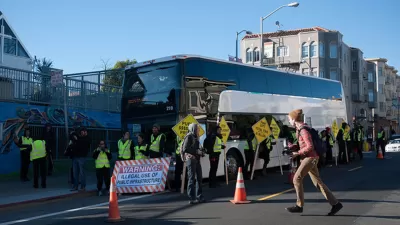The Google ferry was launched Jan. 6 at the Port of San Francisco for its inaugural trip to Redwood City, where Google workers would presumably be bussed to its Mountain View HQ. No word yet whether it was greeted by protests met by its buses in S.F.
Cole Chapman writes that "the ferry runs twice in the morning and twice at the end of the day." He indicates that the demonstrations, some of which have become destructive against the ubiquitous Google buses within San Francisco as they are seen as symbols of tech-driven gentrification, may have prompted the employer to seek less visible ways to transport its workers.
“We certainly don’t want to cause any inconvenience to SF residents and we’re trying alternative ways to get Googlers to work,” said Google in a statement provided to Re/code.
As noted here on Wednesday, Google and other operators of exclusive luxury buses transporting workers south to the Peninsula and Silicon Valley "will require permits and payments under a new 18-month pilot program." The San Francisco Chronicle editorialized on Wednesday, "One Google bus means 50 or more cars taken off the road, transit experts estimate. But the lumbering, dark-tinted vehicles dawdle at Muni bus stops, straddle driving lanes and are a handy stand-in for the numerous ills that afflict San Francisco life, circa 2014."
According to the KPIX broadcast, unlike the region's congested highways, there's plenty of unused capacity on San Francisco Bay, and the Port appeared to welcome the new business. Allen Martin of KPIX writes that "the Triumphant holds 149 passengers (and) the ride takes about 47 minutes each way."
FULL STORY: Google contracts catamaran ferry for employees

Planetizen Federal Action Tracker
A weekly monitor of how Trump’s orders and actions are impacting planners and planning in America.

Map: Where Senate Republicans Want to Sell Your Public Lands
For public land advocates, the Senate Republicans’ proposal to sell millions of acres of public land in the West is “the biggest fight of their careers.”

Restaurant Patios Were a Pandemic Win — Why Were They so Hard to Keep?
Social distancing requirements and changes in travel patterns prompted cities to pilot new uses for street and sidewalk space. Then it got complicated.

Platform Pilsner: Vancouver Transit Agency Releases... a Beer?
TransLink will receive a portion of every sale of the four-pack.

Toronto Weighs Cheaper Transit, Parking Hikes for Major Events
Special event rates would take effect during large festivals, sports games and concerts to ‘discourage driving, manage congestion and free up space for transit.”

Berlin to Consider Car-Free Zone Larger Than Manhattan
The area bound by the 22-mile Ringbahn would still allow 12 uses of a private automobile per year per person, and several other exemptions.
Urban Design for Planners 1: Software Tools
This six-course series explores essential urban design concepts using open source software and equips planners with the tools they need to participate fully in the urban design process.
Planning for Universal Design
Learn the tools for implementing Universal Design in planning regulations.
Heyer Gruel & Associates PA
JM Goldson LLC
Custer County Colorado
City of Camden Redevelopment Agency
City of Astoria
Transportation Research & Education Center (TREC) at Portland State University
Camden Redevelopment Agency
City of Claremont
Municipality of Princeton (NJ)



























